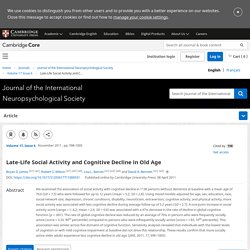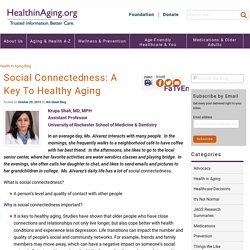

Effects of Social Integration on Preserving Memory Function in a Nationally Representative US Elderly Population. Memory loss is a prominent feature of aging and is associated with substantial declines in quality of life and increased risk of dementia,1,2 institutionalization,3 and mortality.4 Few effective strategies for prevention or treatment have been identified.5 Several studies have suggested that features of the social environment are important predictors of cognitive outcomes among the elderly (those aged 50 and older; for a review, see Fratiglioni et al.6).

We examined the association between social integration and memory loss in a large, representative sample of US residents born before 1948. We explored 3 related issues: whether the associations found in previous studies would be generalizable to a nationally representative sample of elderly in the United States, whether the effects would be stronger among individuals in socially and economically disadvantaged conditions, and whether the results could be attributable to reverse causation. Study Population Assessment of Memory Note. 1. 2. Journal of the International Neuropsychological Society. Crossref Citations This article has been cited by the following publications.

This list is generated based on data provided by CrossRef. James, Bryan D. Glass, Thomas A. Caffo, Brian Bobb, Jennifer F. Helvik, Anne-Sofie Selbæk, Geir and Engedal, Knut 2012. Brown, Cassandra L. Bennett, Jarred S Boyle, Patricia A James, Bryan D and Bennett, David A 2012. Allen, John S. 2012. Staying Social While Aging In Place: 7 Ideas for Active Seniors - Companions For Seniors. For the elderly, aging in place can be convenient, affordable, and flexible.

According to research from the AARP, the vast majority of seniors say that they would prefer to stay at home for as long as possible as they grow older. Receiving long-term care in the comfort and safety of home is a great way for seniors to maintain their independence, keep up their health, and continue to live life to the fullest, while living in an environment that is familiar and full of warm, nourishing memories. At the same time, aging in place is also a powerful way for seniors to connect with their community and nurture meaningful relationships, making life vibrant and fun for years to come! How Can Seniors Remain Social While Aging in Place? Remember: for older adults, aging in place does not have to mean being alone! Maintaining and building these relationships over time is incredibly important. 1.)
Living at home gives seniors the opportunity to host friends or family in their own space. 2.) 3.) 4.) How to Stay Socially Engaged as You Age. Looking for that ever-elusive fountain of youth?

Look no further. There are many things you can do to stay vital and healthy as you get older — such as exercising regularly and eating a healthful diet — but experts now believe that one of the best ways to age gracefully is to engage in a little social networking, both online and off. The Benefits of Staying Engaged As you get older, normal changes in your brain can make it more difficult for you to learn new information or remember things. In people who have dementia, this intellectual impairment becomes so severe that it interferes with their lives. One recent study from the Rush Alzheimer’s Disease Center in Chicago found that highly social seniors had a 70 percent lower rate of cognitive decline than their less social peers.
Tips for Staying Socially Engaged as You Age There are plenty of ways to stay socially connected and intellectually stimulated: Nurture your social network. Social Connectedness: A Key to Healthy Aging > Health in Aging Blog > Health in Aging. Krupa Shah, MD, MPH Assistant Professor University of Rochester School of Medicine & Dentistry In an average day, Ms.

Alvarez interacts with many people. In the mornings, she frequently walks to a neighborhood café to have coffee with her best friend. In the afternoons, she likes to go to the local senior center, where her favorite activities are water aerobics classes and playing bridge. In the evenings, she often calls her daughter to chat, and likes to send emails and pictures to her grandchildren in college. What is social connectedness? A person’s level and quality of contact with other people Why is social connectedness important? It is key to healthy aging. What are some of the life circumstances that can affect one’s social connectedness?